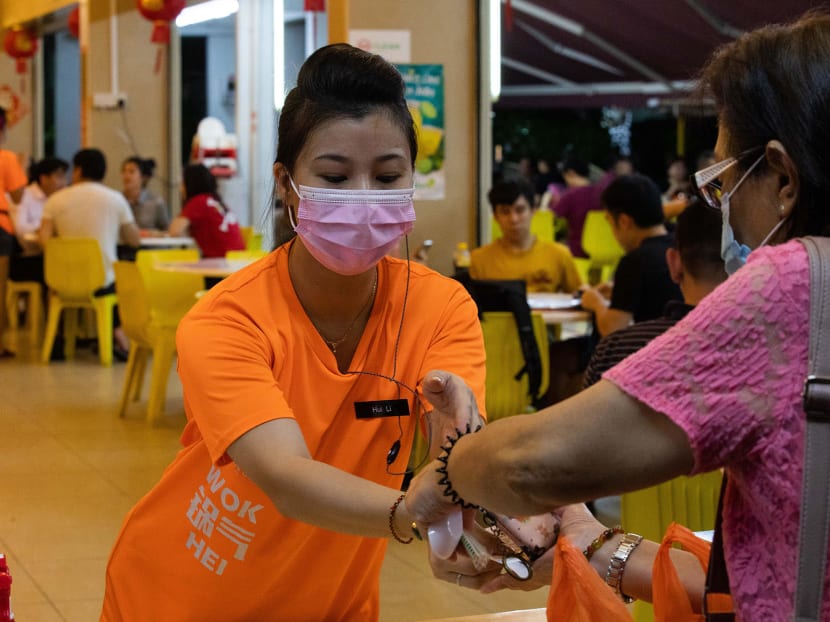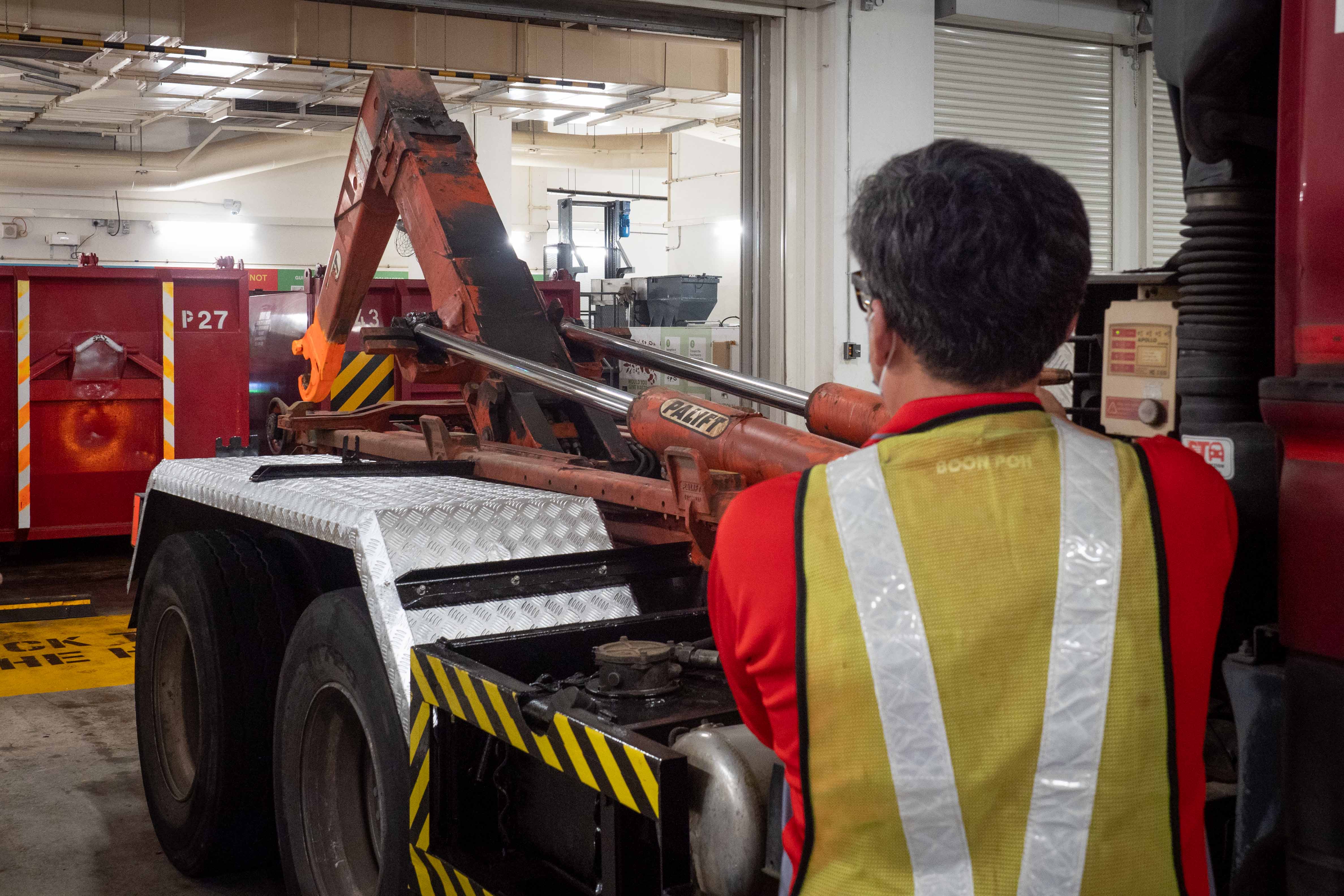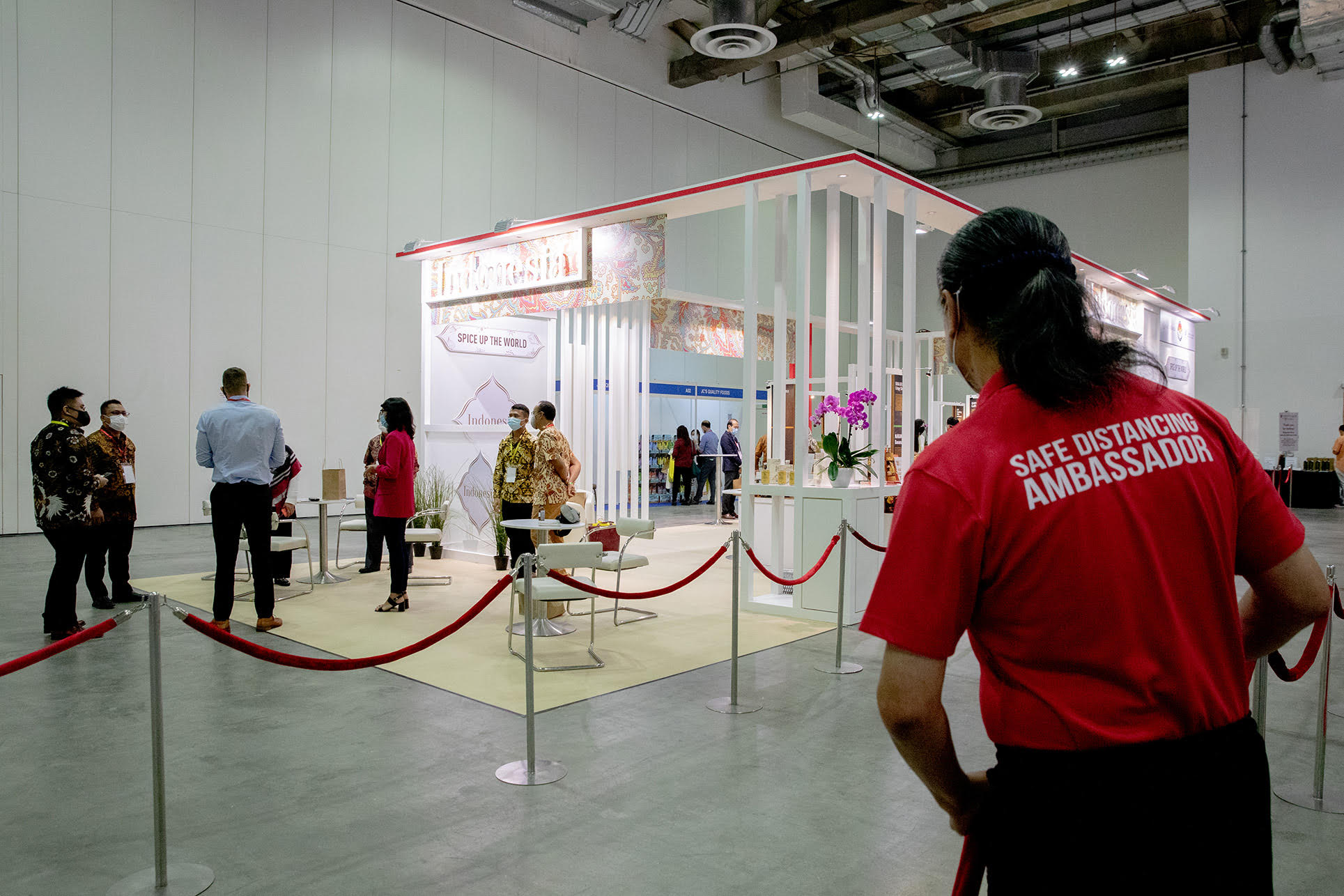'More foreign workers needed': Businesses call for reclassification of services sector to tackle manpower crunch
SINGAPORE — The Singapore Business Federation (SBF) wants the Government and related stakeholders to review the classifications within the services sector, so that businesses reliant on foreign manpower can hire more of these workers or redeploy workers who were in pandemic-related roles to join the sector.

A worker at Keng Eng Kee Seafood handing takeaway food and disposable utensils to a customer.
- The Singapore Business Federation put out a report on how to address the ongoing manpower deficit
- It is proposing that the Government reclassifies the different businesses within the services sector
- This will allow businesses that depend more on foreign manpower to have more such workers
- Another suggestion is for those who held pandemic-related jobs to be redeployed to the services sector
SINGAPORE — The Singapore Business Federation (SBF) wants the Government and related stakeholders to review the classifications within the services sector, so that businesses reliant on foreign manpower can hire more of these workers or redeploy workers who were in pandemic-related roles to join the sector.
These were among the suggestions on how to fight the manpower crunch within the sector, published in a report SBF released on Thursday (May 12).
Retailers who responded to the report told TODAY that they supported the proposal to review classifications within the sector. This is because the services sector has many different areas such as food and beverage (F&B), waste management and finance, each with different needs and levels of reliance on foreign manpower.
However, some of them disagreed that workers who were in pandemic-related roles such as safe distancing ambassadors can be easily redeployed to the services sector, because there are too few of them to fill the manpower gaps and their skills may not be suitable for the sector.
Other suggestions among the nine raised in the report include having better "cross-sector collaboration" to achieve greater operational efficiency, such as by hiring logistics firms to make last-mile deliveries, rather than depend on in-house delivery services.
Another suggestion is for firms to work with the unions and post-secondary educational institutions to train more workers and help retain them in the sector.
SBF said in the report that although the labour supply situation is expected to ease as Singapore moves to live with Covid-19, this has not necessarily been the case for the services sector.
"The reality on the ground is a record rise in job vacancies with the ramp-up in economic activity, but met with difficulties in filling job vacancies, which reflects the growing mismatch of skills and attitudes in the labour market," the report stated.
SBF's chief executive officer Lam Yi Young said: "To maintain Singapore’s reputation as an efficient and vibrant business and leisure destination of choice, the services industries need access to suitable and sufficient manpower to support their operations and even as they double down on automating processes and redesigning jobs, businesses still need to be able to recruit and retain sufficient local and foreign manpower."
He added that SBF had worked with other trade associations and chambers on the report.
Mr Andrew Kwan, president of one such trade association, the Restaurant Association of Singapore, said: "As businesses take concerted efforts to improve our employment proposition to attract talent, near-term labour shortages must be addressed in order for operations to resume and scale up."
In the longer term, manpower policies will need to "reflect the changing structure of the resident labour force with the growing affluence of households and higher educational qualifications of the younger workforce", he added.
“We will need to further study the specific recommendations with our tripartite partners.Mr Desmond Choo, a labour Member of Parliament, on Singapore Business Federation's proposals”
Mr Desmond Choo, a labour Member of Parliament and assistant secretary-general of the National Trades Union Congress (NTUC), said in a Facebook post on Thursday: “We appreciate the effort by SBF to address the manpower crunch and agree that more can be done to ensure that this crunch does not affect business and service delivery.
"We will need to further study the specific recommendations with our tripartite partners.
“At NTUC, we believe that addressing manpower issues must first start with the effort to strengthen our Singaporean core to help our workers reskill and upskill so that they remain relevant and productive.”
In SBF’s report — addressed to the Government, businesses and industry stakeholders — the following are more details on how to adopt a more “nuanced” classification of businesses in the sector.
HAVE DIFFERENT FOREIGN WORKER RATIO FOR SUB-SECTORS
All companies under the services sector are subject to the same work permit requirements such as migrant worker source countries, maximum period of employment, quota on dependency ratio ceiling (DRC) on the number of work permit holders that they can employ and the corresponding levy rate.
The DRC refers to the maximum permitted ratio of foreign workers to the total workforce that a company in the stipulated sector is allowed to hire. The DRC for the services sector is 35 per cent, which means only a maximum of 35 per cent of hires can be foreigners holding work permits.
However, SBF noted that a diverse range of businesses are classified under the sector, such as:
- Financial, insurance, real estate, information and communications, and business services
- Commerce (retail and wholesale trade, for example)
- Community, social and personal services
- Hotels
- Restaurants, coffee shops, food courts and other approved food establishments
"This broad classification does not reflect labour market dynamics such as the nature of work, education level, job demand and resident labour force supply across the significantly different services industries."
For some sub-sectors, SBF noted that foreign manpower is "necessary to meet the demands for such services, even with ongoing efforts to transform the sectors and redesign jobs".
For instance, the businesses in finance and insurance, information and communications technology, and professional services are "fundamentally different" to that of waste management, cleaning, and estate and facilities management.

It added that there could be a more nuanced classification such that more "differentiated policy interventions" can be applied to address specific manpower challenges within the sectors.
For instance, this is "an opportunity to recalibrate the DRC and related foreign manpower policies" for the different services sub-sectors.
Agreeing, Mr Andrew Tjioe, chief executive officer of F&B business Tung Lok Group, told TODAY that there should be more specific classifications because the current one is "simply too broad".
At the moment, there is at least a 25 to 30 per cent shortage in manpower across his restaurants, he added, but the DRC has already been met. This means up to 35 per cent of his workers are foreigners.
Mr Tjioe is hoping that the F&B sub-sector can be reclassified to have its own foreigner ratio.
"I am hoping that (DRC) can be higher, because Singaporeans don’t mind working in the financial sector or other hospitality sectors, but definitely not in F&B," he said.
REDEPLOY TEMPORARY WORKERS
The report also recommended that those who worked in temporary pandemic-related operations may be redeployed to the lifestyle services sector such as retail and F&B, noting that there were around 2,000 safe distancing ambassadors employed by various government agencies as of April this year.

SBF said: "With the number expected to taper as the Government eases Covid-19 restrictions, (this) will allow critical workforce to be redeployed to other sectors, and a more concerted effort can be made for workers to be re-directed to the lifestyle services."
It added that NTUC's Employment and Employability Institute may work with the trade associations to organise job fairs and job-matching services for such workers.
"Many of the front-line jobs supporting Covid-19 operations are similar in nature (to retail and F&B work), involving shift hours and interaction with the public," SBF added.
However, retailers interviewed by TODAY said that the solution may not be effective, due to the different skills required in the services sector.
“These people are often displaced from management (and) office jobs, so to expect them to go to the front line such as in retail and service-oriented roles is a bit difficult.Ms Grace Tan, director of ToTT Store, said of hiring temporary workers who were temperature screeners or safe distancing ambassadors to plug manpower gap”
Ms Grace Tan, director of household kitchenware retailer and lifestyle store ToTT Store, said that she had struggled since last year to fill up two vacancies for service roles within her stores, located at Suntec City downtown and Century Square in Tampines.
She eventually hired tertiary students on a work-and-study programme, but she noticed that those who did pandemic-related jobs such as former safe distancing ambassadors do not typically want to take up service roles.
"These people are often displaced from management (and) office jobs, so to expect them to go to the front line such as in retail and service-oriented roles is a bit difficult," she added.
"Office jobs do not require customer service skills, so they may not be able to handle difficult customers."
Although safe distancing ambassadors have to interact with the public, they are ultimately able to take breaks when they want to and choose who they want to engage. This is different for retail service roles, since they will have no control over when a customer needs their assistance.
Agreeing, Mr Kelvyn Chee, managing director of apparel retailer Decks, said that manpower from this segment can only address "the tip of the iceberg" that is the manpower problem.
Mr Chee said that over the course of the pandemic, he has lost about 40 per cent of his manpower, due to foreigners returning home for good, or residents here being poached by other companies. As a result, although he owned 35 outlets pre-pandemic, he has closed some of them down and has just 22 now.
"There are only 2,000 to 3,000 safe distancing ambassadors, but there’s a serious lack of workers," Mr Chee said. "These guys can solve (about) 5 per cent of this problem, and they may not even want these retailer jobs as they don't want to work strange hours."
WHAT GOVERNMENT SAYS
In response to TODAY's queries on SBF's suggestions, the Ministry of Manpower (MOM) said it recognises that as economic recovery gains momentum, "some segments of the economy may find it challenging to fill job vacancies amid the tight labour market".
It also said it agreed with SBF's stance that there is a need for industries to transform, and that the tripartite partners — namely the Government, businesses and unions — will "continue to walk the journey with employers to build productive businesses and a skilled and diverse workforce".
Among businesses in the services sector, some are tapping trade agency Enterprise Singapore's Enterprise Development Grant to invest in automation, allowing manpower to be more efficiently allocated, MOM noted.
One example it cited was restaurant chain Dian Xiao Er, which installed an automated duck conveyor system in April last year. The system cuts down the preparation time for 1,500 ducks by a third. Before that, eight workers were needed to prepare 1,500 ducks daily.
With the conveyor system, the company was able to re-train its manpower and redeploy them to other job roles, MOM said.
It added that government agencies are also working closely with the industry and unions to "promote good jobs and ramp up local hiring" and will "continue to support our businesses to redesign jobs and improve job quality to attract and retain local workers".
In the short term, MOM will work with various government agencies to provide targeted support for the tourism and aviation industries, with "additional foreign worker quotas on a time-limited basis" to ensure that they can quickly rebound and "capture the opportunities".
"We strongly encourage employers facing manpower shortages to utilise all the available support to press on with efforts to transform and become more manpower-lean, while tapping available sources of local workers, to build up their local manpower core."











